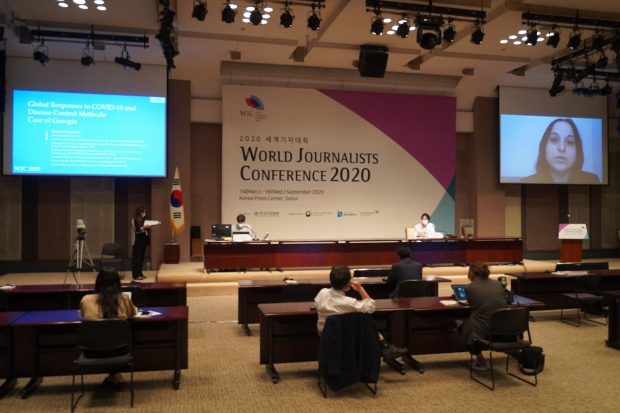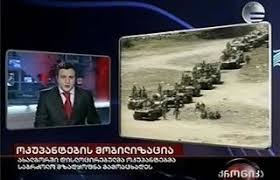
Handling fake news in Georgia

By Khatuna Chapichadze
Georgian Technical University
San Diego State University Professor
TBILISI: One of the biggest international media forums, the World Journalists Conference (WJC), organized by the Journalists Association of Korea (JAK), and held annually in a number of interesting cities and other remarkable places of Korea, was held online this year due to the global pandemic – COVID-19, for the first time in its history.
Monday, September 14, the first day of the three-day event, in which around 100 journalists and other media and non-media professionals from about 60 countries participated, was dedicated to one of the hugest challenges for the contemporary world – fake news, and various countries’ corresponding examples of this phenomenon, as well as to the countermeasures for combating it.
The topic was additionally discussed from the prism of the future of journalism. After the opening address by Dong Hoon Kim, President of Journalists Association of Korea, and Prime Minister Chung Sye-Kyun’s congratulatory message, 22 speakers participated in the session through their topical presentations and Q&A, including Special Speaker – Prof. Min-Kyu Lee from the School of Media and Communication, Chung-Ang University.
For the debate session, I, representing the global community of the Asia Journalist Association (AJA), prepared the following comment, addressing the fake news problem in the post-Soviet republic of Georgia:
“Georgia is among those countries for which the spread of misinformation, disinformation, and/or fake news is, or can be a very grave issue, often causing actually real threats to the domestic and/or foreign security and wellbeing of the country.
In this case, such precedents go far beyond any entertainment and funny stories supposedly involving distribution of different memes, clicking seductive headlines, resulting in heated Facebook debates …

One of the saddest examples of fake news in Georgia has been the well-known incident that took place on March 13, 2010, when a seriously damaging for public psychological and in some cases even physical health, a massive fake news report was deliberately aired by the Georgian pro-government television station Imedi TV in its major informational programme called Chronicle.
The fake news report heavily utilized footage from the Russian-Georgian 2008 war that took place in Georgia’s breakaway region of the so-called South Ossetia and depicted the Russian invasion of Georgia, including fabricated assassination of then president of the country – Mikheil Saakashvili.
During the broadcast, public panic was sparked in Georgia, as many Georgians did not see the disclaimer at the beginning of the broadcast, and assumed that they were watching live events.
Thousands of telephone calls to emergency services were made, citizens hurried to withdraw cash from automatic teller machines, Georgian mobile phone networks crashed, and many prepared to flee the capital Tbilisi and villages and towns near the border with the so-called South Ossetia.
Some units of the Georgian Army took up defensive positions after hearing of the alleged invasion. The Russian news agency Interfax began reporting the news in Russia on the invasion of Georgia and the assassination of Saakashvili, before David Cracknell, an employee of the Georgian government, sent a two-word text message to foreign journalists with the words “Not true.”
Even though three people actually died while watching the hoax, besides the above-mentioned public reaction and detriment, followed by almost unanimous domestic and international condemnation of the programme, including protests from Georgian journalists and the watchdog group – the Georgian Charter of Journalistic Ethics, no legal consequences were enacted against the programme or Imedi TV due to the apparent fact that the highest government officials, including Georgia’s former President Saakashvili, were reportedly revealed in staging and/or supporting the scenario of the programme themselves.

After the government change in Georgia as a result of crucial 2012 parliamentary elections ending Saakashvili’s de facto authoritarian rule, the new Georgian Dream government started initiating laws to tackle disinformation in the media, as well as addressing another quite problematic practice of massive public abuse and defamation.
Georgia’s current President Salome Zurabishvili has emphasized the latter issue several times. In 2004, Georgia decriminalized defamation in line with the OSCE standards.
In order to deal with fake news, the Georgian Charter of Journalistic Ethics has operated Media Checker, a fact-checker and media monitoring platform, since 2015. Along with this, Myth Detector, the website created by the Media Development Foundation with the support of USAID, is also regarded as quite effective tool for combatting disinformation and fake news.”
On Tuesday, September 15, during the second day of the WJC 2020, in relevance to the conference session topic, I gave a speech, addressing the success story of Georgia in the fight against COVID-19 during the first stage of its spread in the country.


